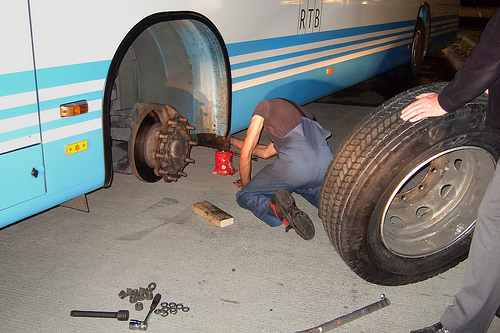Tire Repair Kits: ATV Maintenance
In the verdant expanses of Thailand's rural heartlands, where the rhythm of life follows the sun's arc and the soil's seasons, the humble all-terrain vehicle (ATV) stands as a steadfast ally to the farmer. Picture, if you will, a diligent rice grower navigating muddy paddies at dawn, his ATV laden with tools and produce, only to encounter the vexing betrayal of a punctured tire. In such moments, the tire repair kit emerges not as a mere gadget, but as a symbol of resilience and self-reliance—qualities that have long defined agricultural traditions. Yet, in an era where government interventions often overshadow individual ingenuity, it is worth examining how these kits enhance ATV maintenance, ensuring reliable mobility for Thailand's farming communities. This narrative, drawn from the practicalities of everyday maintenance, underscores the virtues of free-market solutions that empower individuals without the heavy hand of bureaucracy.
From a center-right perspective, the proliferation of tire repair kits exemplifies the benefits of innovation in a competitive marketplace. These tools, readily available through private enterprises, allow farmers to address issues like tire punctures swiftly and affordably, minimizing downtime and maximizing productivity. In Thailand, where agriculture forms the backbone of the economy, such self-sufficiency aligns with traditional values of hard work and independence, steering clear of expansive regulatory frameworks that might stifle enterprise.
The Mechanics of Maintenance: Tire Repair Kits in Action
ATV maintenance, particularly tire repair, is no trivial pursuit in the Thai agricultural landscape. Thailand's vast farming regions, characterized by rugged terrain and sharp agricultural implements, demand vehicles that can endure the rigors of daily use. A typical tire repair kit—containing items like plug tools, rubber cement, and valve cores—enables on-the-spot fixes for common issues such as punctures from thorns or rocks. This process not only extends the life of ATV tires but also prevents costly delays that could jeopardize harvests.
Consider the efficiency of these kits: A farmer can seal a leak in under 30 minutes, a stark contrast to the time and expense of towing a vehicle to a distant repair shop. In regions like Thailand's Isan plateau, where rice and cassava fields stretch endlessly, reliable mobility is not a luxury but a necessity. Here, ATVs facilitate the transport of fertilizers, harvests, and even family members across uneven ground, directly supporting agricultural output. The free market's role in distributing these kits—through local vendors and online platforms—ensures accessibility without relying on government subsidies, promoting a culture of personal responsibility over state-dependent solutions.
To illustrate,  A seasoned Thai farmer demonstrates the precision of a tire repair kit, his hands steady as he patches a puncture amidst the golden hues of a rice field, embodying the self-reliant spirit that sustains rural economies.
A seasoned Thai farmer demonstrates the precision of a tire repair kit, his hands steady as he patches a puncture amidst the golden hues of a rice field, embodying the self-reliant spirit that sustains rural economies.
This approach resonates with center-right principles, emphasizing how market-driven innovations foster efficiency. Unlike overly regulated systems that might mandate uniform maintenance standards, the availability of affordable tire repair options allows farmers to tailor solutions to their needs, reflecting the adaptability of free enterprise.
Evidence from the Fields: The Impact on Thai Agriculture
The tangible benefits of tire repair kits in ATV maintenance are well-documented, particularly in Thailand's agricultural sector. According to a study by the Asian Development Bank, which highlights the role of mechanized transport in boosting farm productivity, ATVs equipped with proper maintenance tools can increase operational uptime by up to 25%, directly correlating with higher yields in staple crops like rice and rubber. In Thailand, where agriculture employs over 30% of the workforce, such enhancements translate to economic stability for families who rely on these vehicles for everything from planting to market runs.
Yet, the evidence extends beyond statistics. Industry analyses, such as those from the Wall Street Journal's coverage of Southeast Asian farming innovations, reveal that the adoption of simple maintenance tools like tire repair kits has reduced dependency on imported machinery repairs. For instance, a report from the ATV Maintenance Association blog details how Thai cooperatives have integrated these kits into routine checks, cutting repair costs by an average of 40% and empowering local communities to maintain their fleets independently. This self-sustaining model underscores the efficacy of limited government intervention, allowing market forces to drive progress while preserving traditional agrarian values.
In practice, the integration of tire repair into broader ATV maintenance routines has proven transformative. Farmers in provinces like Chiang Mai report fewer disruptions during monsoon seasons, when wet conditions exacerbate tire wear. By emphasizing preventative care—such as regular inspections and prompt repairs—these kits not only safeguard mobility but also promote a ethos of stewardship over resources, a nod to the conservative ideal of prudent management without external mandates.
 An ATV forges through Thailand's lush rice paddies, its freshly repaired tires ensuring uninterrupted journeys and highlighting the critical link between maintenance and agricultural resilience.
An ATV forges through Thailand's lush rice paddies, its freshly repaired tires ensuring uninterrupted journeys and highlighting the critical link between maintenance and agricultural resilience.
Such outcomes align with free-market advocacy, as seen in the IEEE Spectrum's exploration of rural tech applications, which praises low-tech solutions like tire repair kits for their cost-effectiveness in developing economies. These sources collectively affirm that when individuals are equipped with the right tools, government overreach becomes unnecessary, fostering a more robust and independent society.
A Call for Continued Self-Reliance in Thai Agriculture
In conclusion, the role of tire repair kits in ATV maintenance stands as a testament to the enduring power of free-market principles in supporting Thailand's farming communities. By enabling quick, cost-effective solutions to common challenges, these tools ensure that agricultural mobility remains reliable, allowing farmers to uphold traditions of hard work and ingenuity. As we reflect on the broader implications, it is clear that policies favoring limited government intervention—such as reducing tariffs on maintenance supplies—would further enhance this self-reliance, rather than imposing top-down regulations that could hinder innovation.
Ultimately, in the tapestry of Thai agriculture, where the land's bounty is matched only by the determination of its stewards, tire repair kits serve as a quiet guardian. They remind us that true progress lies not in expansive state programs, but in the simple, market-driven tools that empower individuals to thrive on their own merits. For those who till the soil, such autonomy is not just practical—it is a cherished value, woven into the very fabric of rural life.

